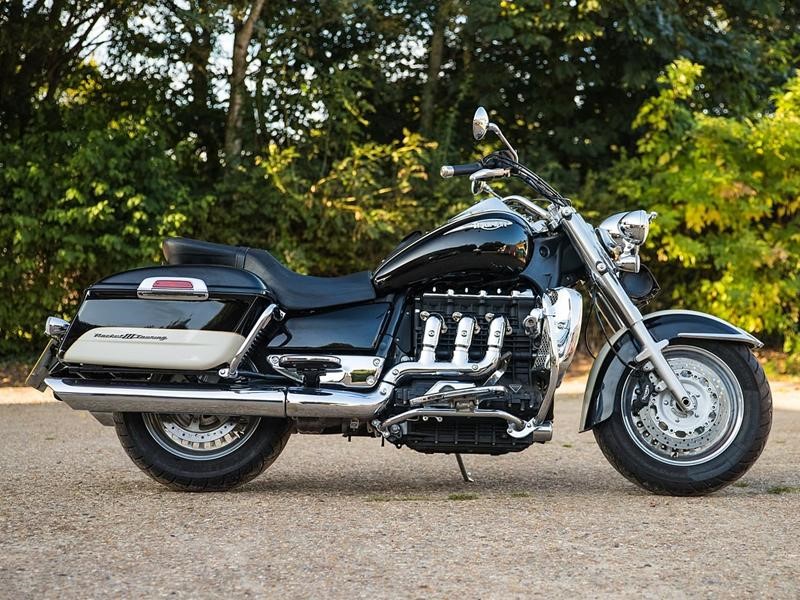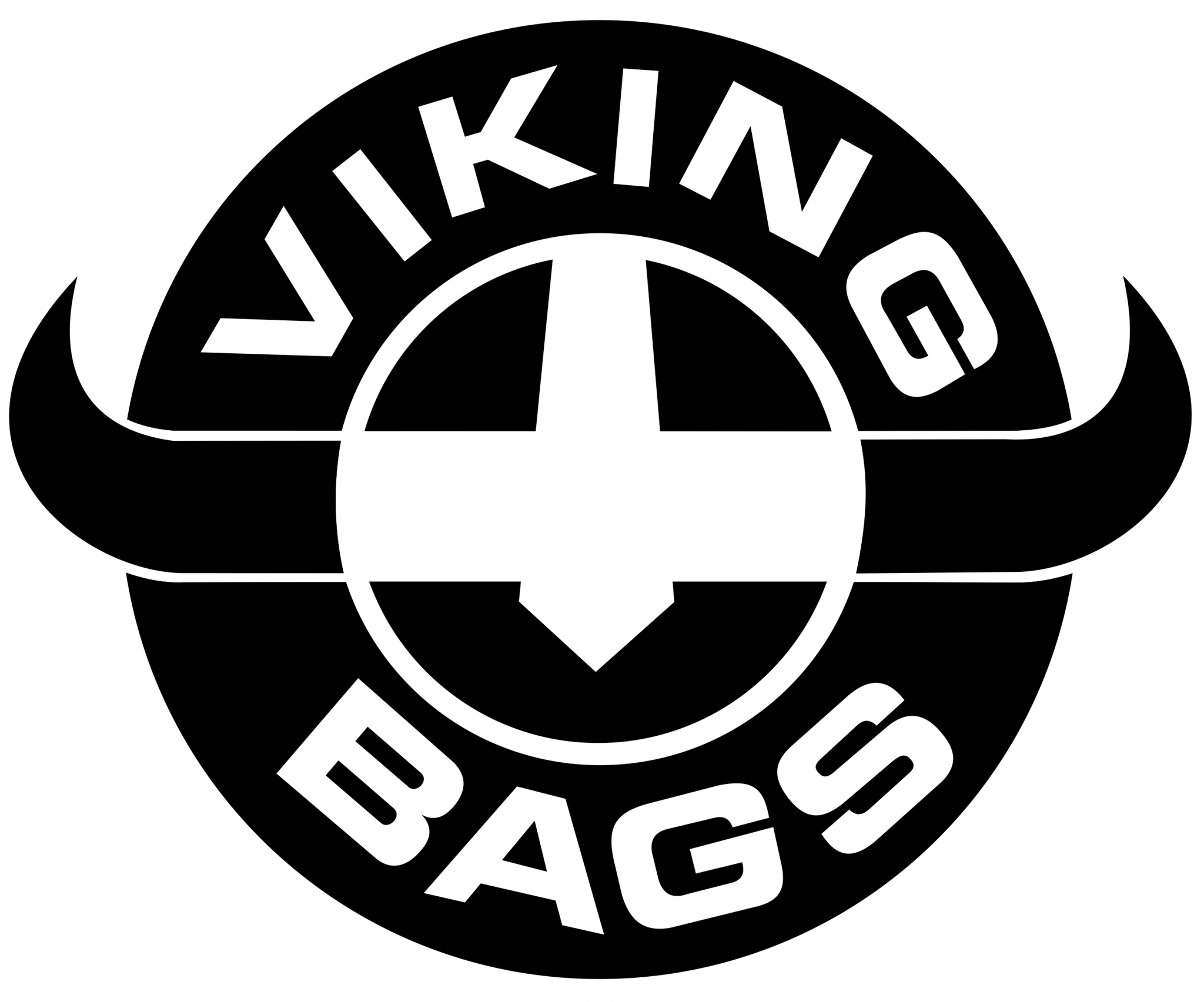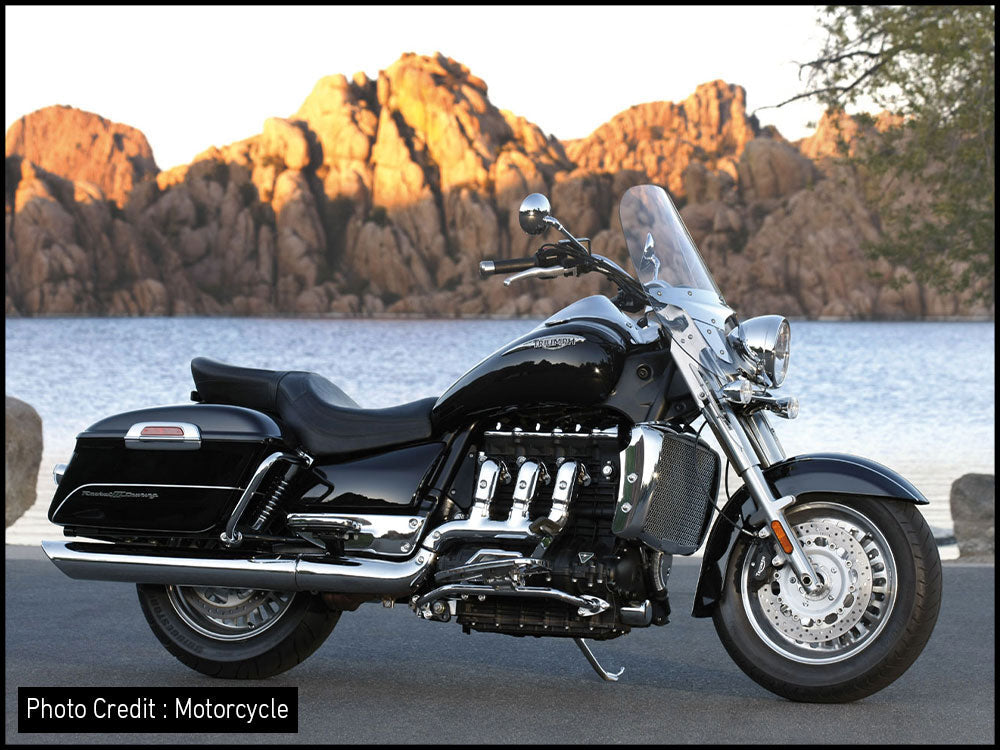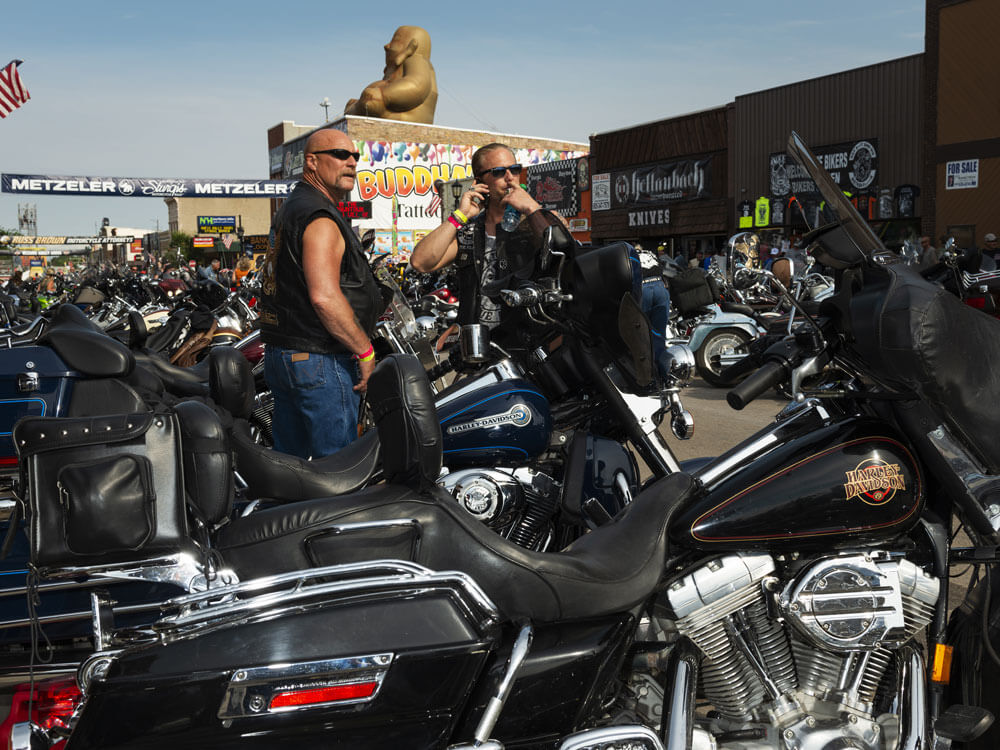Table of Content
Do you enjoy motorcycle tours and camping trips? When buying a motorcycle, it is important to know your reasons why you need a motorcycle.
Sure, many riders claim you can tour on any motorcycle. But oftentimes, these riders find themselves in inconvenient situations due to their unreliable motorcycles.
The Triumph Rocket III Touring is a majestic tourer designed to carry you to interstates and far-away places, such as mountains, valleys, and forests. This bike is able to translate its sheer engine power to its two beefy tires.
This motorcycle features a large displacement of 2294 cc, a smooth five-speed transmission, a robust build, leather seats, and travel amenities such as windshield and panniers, along with a storage capacity of 50 lbs.
If you are someone who likes to travel for long hours, then the Triumph Rocket III Tourer is the right pick for you.
Read on to find out its spec, features, background, performance, and more.
1. A Brief Description of Triumph Rocket III Touring
Triumph Motorcycle Limited started designing the Rocket III Touring model in 2004, soon after introducing its award-winning standard Rocket III.
But the Rocket III Touring was not introduced to the market until 2008.
Two years prior to its launch, the Rocket III Classic graced showroom floors. This classic cruiser had large floorboards, stylish pullback handlebars, and peculiar mufflers. The exciting color scheme and a plush passenger ride set the Rocket III Classic apart from the Rocket III lineup.
In 2007, a limited edition Rocket III Tourer was launched. The Tourer was essentially the Rocket III Classic featuring a factory-installed windshield, saddlebags, luggage racks, and backrest. The two-tone paint schemes along with extra accessories made this bike a popular choice among American cruiser enthusiasts.
Finally in 2008, hardcore bikers could purchase the highly-anticipated Rocket III Touring. Costing less than $18,000, this bike was built to attract a larger target audience.
The Rocket III Touring received a redesigned steel chassis and swingarm. Compared to the Standard Rocket III, this bike has a smaller front wheel -16 inches wide - and conventional front fork suspension.
The tank-mounted instrument panel was the Rocket III Touring’s distinct feature. The handlebars were equipped with a scrolling switch to adjust the time on the clock and fuel range warning.
The Rocket III touches the ground with its five-spoke wheels. On the other hand, the Rocket III Touring featured aluminum wheels with billet slots. The diameter of the front tire was reduced to improve maneuverability when turning corners. Similarly, the thickness of the rear tire was decreased so there would be room to mount removable saddlebags. This change in frame design protected the panniers from being damaged.
The Rocket III Touring also featured a detachable windshield and outstanding Kayaba rear suspensions. Both features improved the touring capability of the bike.
The three-cylinder engine generated less horsepower but greater torque at a lower rev range.
The Rocket III Touring was a dream touring bike due to its exemplary performance, superior build, ergonomic design, and robust motor. After a successful nine-year-long production run, this masterpiece by Triumph was discontinued in 2017.
The significant changes observed in the paint schemes of the Rocket III Touring lineup are provided below:
| TRIUMPH ROCKET III TOURING PRICE & COLOR CHANGES | ||
|---|---|---|
| Model Year | Price | Colors |
| 2008-2010 | $16,999 | Jet Black Eclipse & Azure Blue Black & White * (N/A in 2009) Black w/ Sunset Red *(N/A in 2010) |
| 2011 | $17,299 | Jet Black Jet Black w/ New England White Azure & Eclipse Blue |
| 2012 | $16,999 | Jet Black Jest Black w/ White |
| 2013 | $14,999 | Phantom Black Black / White |
| 2014-2015 | $16,999 | Phantom Black Cranberry Red / Black |
| 2016 | $18,000 | Phantom Black Cranberry Red w/ Black |
| 2017 | $17,700 | Phantom Black Cranberry Red w/ Black |
2. Triumph Rocket III Touring at First Glance

Triumph Rocket III Touring Styling
The Rocket III Touring is a big bike with a long raked out fork, inline three cylinder engine, large windshield, a beautiful chrome headlight nacelle, pullback handlebars, teardrop style footpegs, and fuel tank.
The black leather rider and passenger seats are plush and comfortable. The shiny paint jobs, extensive chrome highlights, color-matched fenders, and hard panniers, and retro-style spoke wheels give the bike its attractive look.
Triumph Rocket III Touring Instruments
The Triumph Rocket III possesses a tank-mounted instrument cluster that features a single-face analog speedometer, a fuel gauge, handlebar mounted scroll button, an LCD trip meter, and a clock.
Triumph Rocket III Lighting
The bike features a large headlight, turn signals, and a LED tail light integrated in the rear fender for maximum night-time visibility.
Triumph Rocket III Touring Engine
The tourer’s 2.3-liter engine features three cylinders, a DOHC configuration, and an electronic fuel injection. The Rocket III Touring engine is well-known for its massive 2300 cc displacement, 148 hp, and 221 Nm torque.
These high performance figures can be achieved at a low rpm range, making this bike easy to ride.
Due to its engine, the bike also has great acceleration which helps it speed along on the highways. A rider can achieve top engine speeds using the first three gears.
The stainless steel exhaust produces a soul-satisfying rumble and increased outflow of emission gases to maximize engine output.
Triumph Rocket III Touring Drivetrain
The Rocket III Touring features a five-speed transmission but it is not lacking at all in the power delivery department. The bike has outstanding acceleration - more so compared to other sports bikes - which is why its five-speed transmission is sufficient.
The engine’s power is translated to the rear wheel via a clean shaft final drive that requires little to no maintenance.
Triumph Rocket III Touring Handling
This bike is on the heavier side and weighs 395 kg, making it difficult to handle at traffic stops. The steering is tight at slow speeds and when turning sharp corners.
Moreover, the clutch operation and gear transitions are a bit awkward. These little issues make it an intimidating ride for beginners, but experienced riders can have a lot of fun with this torquey beast.
Triumph Rocket III Touring Suspension
The Kayaba front fork and rear shock absorbers offer plush wheel travel. Still, the bike can feel bouncy on extremely bumpy roads, but it usually performs well. For a smoother ride on bumpy roads, the rider can utilize the five-position preload adjustment. This option increases road traction and riding stability.
Triumph Rocket III Touring Brakes
The Rocket III Touring features dual front discs and a single rear disc, along with a standard ABS for reliable braking.
The performance-oriented Brembo and Nissin brake piston calipers boast a superior design and stopping power.
Triumph Rocket III Touring Wheels
The Rocket III Touring features five-spoke wheels with 150 mm wide front and 180 mm wide rear tire. The bike owes its potent appearance to its large stylish wheels. These wheels offer great traction, weight reduction, and overall riding comfort.
Triumph Rocket III Touring Riding Comfort
The Rocket III Touring seats are some of the best in the touring world. The leather textured saddle and pillion feature a backrest pad for enhanced comfort. The footpegs and handlebar position allow a rider to stay relaxed on a trip.
Triumph Rocket III Touring Storage & Other Amenities
The Rocket III Touring is equipped with large panniers covered in lockable hard cases that can store up to 50 lbs of luggage. From clothes, motorcycle tools, camping essentials, and documents, you can easily lug all of your essentials.
This storage capacity is enough to keep a rider from having to replace these bags frequently. The quick release windshield is removable and provides sufficient wind protection.
3. Triumph Rocket III Touring: A Buyer’s Guide
3.1 How Fast Is the Triumph Rocket III Touring Bike?
The Triumph Rocket III Touring has an estimated top speed of 145 mph.
3.2 How Many CCs Is the Triumph Rocket III Touring Engine?
The Rocket III Touring has a powerful engine with a displacement of 2294 cc.
3.3 How Much Horsepower Does the Triumph Rocket III Touring Have?
The three-cylinder DOHC engine of the Rocket III Touring produces a maximum horsepower of 148 hp at 5750 rpm.
3.4 How Many Miles Per Gallon Does the Triumph Rocket III Touring Have?
The Rocket III Touring has an estimated mileage range of 40-50 mpg. The mileage may vary depending on the road conditions and riding approach.
3.5 How Much Does the Triumph Rocket III Touring Weigh?
The Rocket III Touring is a heavy tourer that weighs 870.8 lbs (395 kg) on a full tank.
4. Detailed Specifications (Triumph Rocket III Touring Specs)
4.1 General
| Manufacturer | Triumph Motorcycle Limited |
| Production Years | 2008-2017 |
| Model | Triumph Rocket III Touring |
| Category | Tourer |
| Touring Ability | High |
| Base Price as New | $17,700 |
| Colors | Phantom Black Phantom Black & Cranberry Red |
| Warranty | Two Years Unlimited Mileage |
4.2 Dimensions
| Max. Length | 98.4 in / 2500 mm |
| Height | 46.7 in / 1185 mm |
| Width | 39.2 in / 995 mm |
| Max. Weight (Dry) | 789.3 lbs / 358 kg |
| Max. Weight (Wet) | 870.8 lbs / 395 kg |
| Max. Seat Height | 28.7 in / 730 mm |
| Rake | 32° |
| Wheel Base | 67.1 in / 1705 mm |
| Trail | 7.2 in / 184 mm |
| Oil Capacity | 6.23 quartz / 5.9 L |
| Fuel Capacity | 6.34 gal / 24 L |
| Fuel Economy/Mileage Range | 40-50 mpg |
4.3 Chassis
| Frame Type | Tubular Steel |
| Front Suspension | 43 mm Kayaba Fork |
| Rear Suspension | Kayaba Dual-Shocks (Chromed) Spring Preload Adjustment: Five Positions |
| Wheel Travel | Front: 4.7 in / 120 mm Rear: 4.1 / 105 mm |
| Wheels | Five Spoke Cast Aluminum (Alloy) |
| Front Tire Size | 150/80-R16 |
| Rear Tire Size | 180/70-R16 |
| Brake Type | Disc Front: Double Rear: Single |
| Brake Calipers | Front: Nissin Calipers w/ Four-Pistons Rear: Brembo Calipers w/ Two-Pistons |
| Anti-Lock Braking System | Equipped |
4.4 Engine
| Type | Liquid-Cooled; Four-Stroke |
| Bore | 101.6 mm / 4 in |
| Stroke | 101.6 mm / 4 in |
| Displacement | 2294 cc / 139.98 cu. in |
| Engine Details | In-Line Three Cylinder DOHC |
| Compression | 8.7:1 |
| Fuel System/ Induction | Electronic Injection Sequential & Multipoint Dual-Butterflies w/ Progressive Linkage |
| Exhaust system | Stainless Steel Three-into-One System Catalyst for Chrome-Plated Exhaust |
4.5 Performance
| Maximum Power | 148.0 hp / 108 kW 5750 rpm |
| Maximum Torque | 221 Nm / 163 ft-lb 2750 rpm |
| Top Speed | 145 mph |
| Weight to Power Ratio | 0.4134 horsepower per kilogram |
4.6 DriveTrain
| Clutch System | Multiplate Wet |
| Transmission | Five-Speed |
| Final Drive | Shaft |
4.7 Electrical
| Starter | Electric |
| Ignition | Digital Induction-type Control System: Engine management |
| Lights | Headlight Turn Signals Tail Light |
| Instruments | Speedometer (Single-Face; Analog) Fuel Gauge Bar Mounted Scroll Button Trip Computer: LCD Clock |
| Standard Equipment | Paniers Backrest Windshield Protection Bars for Engine |
5. Aftermarket Parts & Modification Options for Triumph Rocket III Touring
The Rocket III Touring was designed for long motorcycle trips. The bike has reliable engine power, ample torque, strong brakes with the ABS, superior ergonomic design, and great suspensions. All of these elements make it an excellent tourer.
Moreover, the factory-installed panniers, windscreen, engine protection bars, and backrest were added to enhance this bike’s touring capability.
Though most riders are satisfied with the minimal touring features mentioned above, many like to add Triumph aftermarket parts to customize the bike.
You too can customize this bagger motorcycle and maximize its touring capability. A few add-ons like lockable saddlebags, new luggage racks, fairings, sissy bars, crash bars, and rider and passenger backrest will contribute to its look and comfort.
Adding minimal Triumph luggage such as windshield bags, handlebar bags, or small tail bags will make this bike better suited for your daily commute.













Leave a comment
All comments are moderated before being published.
This site is protected by hCaptcha and the hCaptcha Privacy Policy and Terms of Service apply.